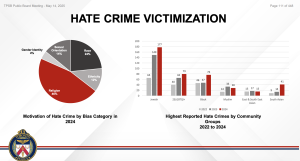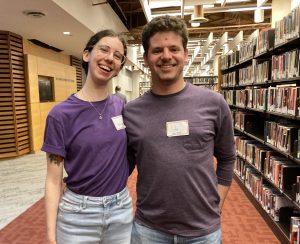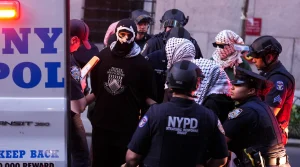Reflecting on her exacting craft, Canadian playwright Hannah Moscovitch talks about the difficult trick of “pulling something from nothing.”
“I tend to write without knowing where I’m going,” she explained in an interview. “I believe in the emergence of an idea while I’m writing. I write to find an idea.”
This method may seem chaotic to those who prefer a tightly scripted outline. But for Moscovitch, spontaneity is extremely important. Indeed, it is her modus operandi in the creative process, her passport to a world of imagination.
Judging by the arc of her career, Moscovitch’s approach has served her rather well.
At the age of 34, she is one of Canada’s most accomplished young playwrights. The Tarragon Theatre’s playwright-in-residence, Moscovitch has written 11 plays since 2005, some of which have won Dora Mavor Moore Awards and one of which was nominated for a Governor General’s Award.
With a new year having begun, Moscovitch is in the news again, thanks to her association with Toronto’s Tarragon Theatre. Until March 24, it is staging four of her plays – In This World, This Is War, Little One and Other People’s Children, her newest play. All four plays will hit the road after that.
As well, she is writing a play for the Stratford Festival and the Manhattan Theatre Club, working on an adaptation of Anne-Marie MacDonald’s novel, Fall on Your Knees, and adapting Alison Pick’s novel, Far to Go, for the screen.
In addition, she is working on a new play about Jewish gangsters. “I love bad-assed Jews,” she said with a glint of mischief in her eyes.
As reviewers have consistently observed, Moscovich’s talent lies in an ability to mix tragedy with humour and leaven intellect with emotion.
“There is always dark humour in my work. I’m interested in showing a world that is complex, where people can be very malicious or very generous. We have a great capacity for good and evil. It’s hard to understand people without understanding their complexity.”
Moscovitch, originally from Ottawa but now based in Toronto, discovered her niche while studying acting at the National Theatre School in Montreal, in which she enrolled after spending several months on a kibbutz in the Galilee.
Upon discovering that she was more interested in achieving contact with the text of a play rather than in wringing the meaning out of it as an actor, she dashed off her debut play, Don’t Walk Alone, in 1999. Read and work-shopped at the National Theatre School, it was a turning point for her. As she observed, “It became immediately evident to me that I was better at playwrighting than acting,”
Nonetheless, she remained in the National Theatre School’s acting program. But after graduating, Moscovitch rejected an opportunity to audition for a role at the Stratford Festival and thereby effectively turned her back on a career as an actor. “I was not that fond of acting,” she said. ”I felt called to writing. I had a vision of the world I wanted to communicate.”
Moscovitch moved to Toronto to realize her dream, but it was a hard slog. As she continued to hone her skills as a budding playwright, she settled down to complete a BA in literature at the University of Toronto.
To support herself, she took odd jobs as an actor and a drama teacher, and toiled as a server and bartender at a restaurant, where she was exposed to a sexist environment and the vagaries of human behaviour.
“My life was uncertain and unstable,” she recalled.
But persevering, Moscovitch wrote Essay, a play concerning gender politics in academia and staged in 2005. She took a further step forward in 2006 with The Russian Play, a romance that unfolds during the Stalinist era in the former Soviet Union.
By this juncture, she was no longer a student, having dropped out of the University of Toronto. “My dad jokes I’m the only member of the family without a degree,” she chuckled.
Her Jewish father, Allan Moscovitch, teaches economics at Carleton University, while her Catholic mother, Julie White, works as a labour researcher. Moscovitch’s younger sister, Sarah, is an intern at a publishing company.
With East of Berlin, premièred at the Tarragon Theatre in 2007, Moscovitch hit her stride as a professional playwright. As she put it, “I had worked out my voice and learned how to structure a play.”
Looking back, she believes that two events catapulted her to her current status as one of Canada’s leading playwrights.
The Russian Play, written when she was a University of Toronto student, was picked up by the Magnetic North Theatre Festival in Ottawa. Shortly afterward, the Tarragon Theatre mounted a production of East of Berlin.
In retrospect, she agrees that these plays were of the utmost importance. “I got offered a bunch of commissions from theatres across Canada,” she said. “I was now on their radar.”
Two of her plays, East of Berlin and The Children’s Republic, have delved into the Holocaust.
Moscovitch, who was brought up Jewish, was drawn to the Holocaust when she was 12. “I was obsessed with it,” she said. “I remember asking my father: how many people is six million?”
East of Berlin, her first foray into this genre and the recipient of the Governor General’s Award nomination, turned on the legacy of the Holocaust and focused on the relationship between the son of a Nazi war criminal and the daughter of an Auschwitz concentration camp survivor.
She submitted The Children’s Republic after writing In This World, which deals with racial and sexual politics, and The Huron Bride, a treatment about the supernatural.
The Children’s Republic, set in the Warsaw Ghetto, was produced in 2009 and was inspired by her visit to Poland as a teenage participant in the March of the Living, an annual educational tour of former extermination camps.
”It had an incalculable effect on me,” she mused. “The Holocaust is never far from my thoughts. It overshadows my life. I see extremes of human behaviour in the Holocaust.”
Apart from connecting her to such an horrific and unprecedented event, the March of the Living forced Moscovitch to sadly acknowledge that some Jews do not even consider her Jewish.
During the trip to Poland, an Orthodox rabbi pointedly questioned her identity as a Jew. His comments left a bitter taste in her mouth: “I went to Hebrew school. I had a bat mitzvah. We kept kosher. I went to temple. I know all the prayers.”
Since the March of the Living, Moscovitch has adopted an ambivalent approach to her Jewishness. When she was asked whether she considers herself Jewish, she replied, “Yes and no. I identify completely, yet not at all.”
Moscovitch, however, remains deeply Jewish. She plans to marry her fiancé, the theatre director Christian Barry, with whom she has worked, in a Jewish ceremony. The wedding date is set for the summer of 2014.






